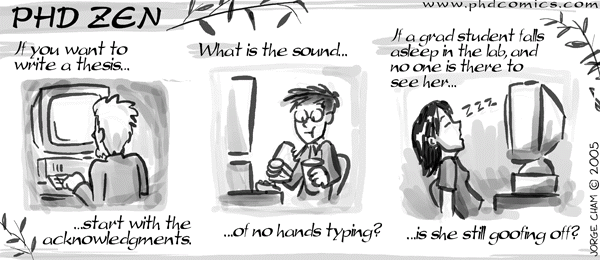Graduate Researcher KnowHow
Welcome!
Getting a research degree can be exciting. You will be able to immerse yourself in your research field, discover new knowledge, make new friendships and develop new skills. At the end, you’ll experience a feeling of personal achievement. Most find the journey rewarding, but there are likely to be some challenges.
A research degree is very different to coursework study; it has no set timetables for lectures and no short written assignments. Although you’ll have the support of your supervisors, you’ll need to be proactive and develop:
- high-level academic writing skills
- critical thinking and reading skills, and
- solid project management skills.
During the course of your research you need to meet three milestones that mark significant points in your progress:
- The first milestone, your confirmation of candidature, is perhaps the most important.
Until this is achieved, you are considered to be a probationary candidate. When the review panel approves your research proposal, you become a research candidate. - The second milestone (previously called the mid-candidature review).
- The third milestone (previously called the completion seminar).
Click on the tabs at the top of this page for resources to support you through these milestones and achieve successful submission. Here is a table listing the resource topics and the milestones that they best support:
| General topic | 1st Milestone | 2nd Milestone | 3rd Milestone |
| Managing yourself and your research | ✓ | ✓ | ✓ |
| Critical reading | ✓ | ✓ | ✓ |
| The research proposal | ✓ | ||
| Becoming a research writer | ✓ | ✓ | ✓ |
| Presenting your research | ✓ | ✓ | ✓ |
| Getting published | ✓ | ✓ |
Here are some other useful resources:
Frequently Asked Questions
Do you have a question about research writing or study? Check out our FAQ section to see if we have an answer.
- Your supervisors are your primary support, guiding you throughout your research degree.
- The School of Graduate Research supports you with research education, administration and policy. For example, PhD Up workshops are run throughout the year on a wide variety of topics. The SGR also offers a statistical consultancy service. It’s a good idea to familiarise yourself with the Higher Degrees by Research Policy.
- The RMIT Library will help you find literature, including other theses, use research databases and EndNote, and much, much more. The liaison librarians for your school are subject specialists and will help you find relevant information.
- The Library also has research-focused academic advisers to support you with research writing and study skills such as critical reading. They produced this website, and they offer PhD Up workshops related to research writing. Also, check out Learning Lab for other interactive online resources.
“Piled Higher and Deeper” by Jorge Cham; www.phdcomics.com
- RMIT Connect offers a range of student support, including International Student Support, Counselling, Careers, Disability Support and Wellbeing.
- RMIT Student Union assists with information about clubs, societies and student life.
- RMIT Postgraduate Department, as a section of the Student Union, provides specific support for postgraduate students.
Research writing blogs are great for discussion and advice. The best include:
- The Thesis Whisperer
- The Doctoral Writing SIG
- Patter
- The Research Whisperer
- PhD2Published
- Writing for research
At the national level:

